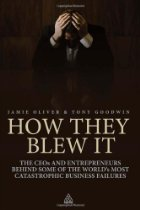 Reach back into your memories of your high school English class and remember hubris, that overwhelming, overblown feeling of pride and self-confidences, that the gods enjoy punishing, usually with maiming, sometimes with thunderbolts. How They Blew It: The CEOs and Entrepreneurs Behind Some of the World's Most Catastrophic Business Failures catalogs some of the most astonishing business failures of the past decade and hubris seems to be the principal cause of many of these failures. That and losing track of what business, exactly, their companies were in.
Reach back into your memories of your high school English class and remember hubris, that overwhelming, overblown feeling of pride and self-confidences, that the gods enjoy punishing, usually with maiming, sometimes with thunderbolts. How They Blew It: The CEOs and Entrepreneurs Behind Some of the World's Most Catastrophic Business Failures catalogs some of the most astonishing business failures of the past decade and hubris seems to be the principal cause of many of these failures. That and losing track of what business, exactly, their companies were in.From entrepreneurs that ran afoul of their former business/government allies (Khodorkovsky, Berezovsky and Zhengyi) to CEOs who were eaten for lunch when the banks tanked (Johannesson, Fuld and Cayne), and including the tragic ends of two CEOs (Merckle and Foster) who took their lives--and the lives of his family, in the case of Foster--when their investments fell apart, How They Blew It is an international rogues' gallery of business leaders whose investments just seemed to implode. One of the conclusions that the book reaches is that the failed business leaders were too smart for their own good and tended to overlook what their delegates were doing or to keep their eye on the business bottom line. As a statement about how to stay focused on the core business, How They Blew It lays out a case for looking to the future while also concentrating on the present.
Though most of the cases are laid out in a lurid, breathless fashion, and most of the sources cited are business periodicals with no references to books written about the events, the book does also remind the reader that entrepreneurs can be very successful, and even if they don't achieve dazzling fortunes, entrepreneurs account for a significant number of jobs and create wealth, even on a small scale. This book would be useful to librarians who are trying to get a handle on some of the biggest business scandals and debacles of the past decade but it would also provide a starry-eyed entrepreneur with a warning about reaching too far with one hand while failing to hold on to a firm base with the other. Which is the point about stories about hubris--confidence based in actual achievement is good, but excessive pride is punished. Thankfully only in stories is it punished with thunderbolts.